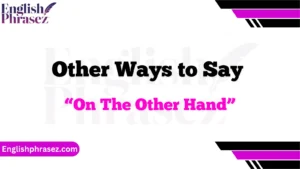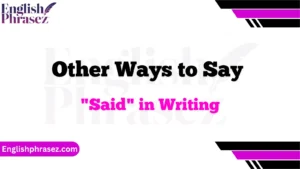Giving praise and encouragement is crucial in motivating and appreciating someone’s efforts. While saying “Great job” is a common way to recognize someone’s hard work, varying your expressions can make your praise more impactful and specific. Whether you’re acknowledging a colleague’s excellent performance, a friend’s achievement, or a team’s success, using different phrases can add a personal touch and enhance your message.
In this blog post, we’ll explore 20 alternative ways to say “Great job,” complete with meanings, tones, explanations, and real-life examples. These phrases will help you articulate your praise more creatively and effectively.
Here’s the list of 20 alternative ways to say “Great job”:
- Well Done
- Fantastic Work
- Impressive Effort
- Excellent Job
- You Nailed It
- Top Notch
- Great Going
- You Did Amazing
- Bravo
- Kudos
- Great Achievement
- Remarkable Job
- Awesome Work
- Spot On
- Outstanding Effort
- Superb Performance
- Hats Off to You
- You’ve Outdone Yourself
- High Five
- Congratulations on a Job Well Done
1. “Well Done”
A classic expression of approval, “Well done” is straightforward and effective. It’s suitable for both formal and informal contexts.
Meaning:
Recognizes accomplishment or success in completing a task.
Tone:
Positive, encouraging.
Explanation:
This phrase directly acknowledges that the person has performed well, without any additional flair.
Example:
After successfully completing a presentation, your manager might say, “Well done on the presentation. It was clear and engaging.”
2. “Fantastic Work”
“Fantastic work” adds a bit more enthusiasm to your praise, emphasizing the high quality of the effort.
Meaning:
Commends the outstanding quality of the work done.
Tone:
Enthusiastic, appreciative.
Explanation:
This phrase conveys strong approval and highlights the exceptional nature of the work.
Example:
A teacher might tell a student, “Fantastic work on your essay; your arguments were very compelling.”
3. “Impressive Effort”
“Impressive effort” focuses on the hard work and dedication put into a task, not just the outcome.
Meaning:
Acknowledges the significant amount of effort and energy involved.
Tone:
Respectful, admiring.
Explanation:
This phrase praises the process and determination, rather than just the result.
Example:
A coach might say to an athlete, “Impressive effort in practice today; your dedication is evident.”
4. “Excellent Job”
“Excellent job” is a formal and straightforward way to commend someone’s performance.
Meaning:
Praises the high standard of the completed work.
Tone:
Formal, appreciative.
Explanation:
It emphasizes that the job was done exceptionally well.
Example:
A project lead might say, “Excellent job on the report. Your analysis was thorough and accurate.”
5. “You Nailed It”
The phrase “You nailed it” is informal and conveys a sense of perfect execution.
Meaning:
Indicates that the task was completed with precision and skill.
Tone:
Casual, enthusiastic.
Explanation:
It’s often used when someone has performed a task exceptionally well.
Example:
After a successful pitch, a colleague might say, “You nailed it with that pitch; the client was very impressed.”
6. “Top Notch”
“Top notch” suggests that the work is of the highest quality.
Meaning:
Refers to something being of superior quality or excellence.
Tone:
Complimentary, appreciative.
Explanation:
This phrase is often used to describe something that exceeds expectations.
Example:
A supervisor might comment, “Your report was top notch; it was exactly what we needed.”
7. “Great Going”
“Great going” is an informal way to express encouragement and praise for progress.
Meaning:
Acknowledges ongoing effort and success.
Tone:
Encouraging, informal.
Explanation:
It’s often used to boost morale and maintain motivation.
Example:
A friend might say, “Great going with your new project; keep up the hard work!”
8. “You Did Amazing”
The phrase “You did amazing” offers a personal touch, emphasizing the individual’s outstanding performance.
Meaning:
Highlights the impressive nature of someone’s performance.
Tone:
Personal, enthusiastic.
Explanation:
This phrase is used to express admiration and personal appreciation.
Example:
After a successful performance, a director might say, “You did amazing tonight; the audience loved every moment.”
9. “Bravo”
“Bravo” is a classic term used to show admiration, often in more formal or celebratory contexts.
Meaning:
An expression of praise or approval, especially for a performance.
Tone:
Formal, celebratory.
Explanation:
Often used in theatrical or formal settings to commend someone.
Example:
After a brilliant speech, the audience might clap and shout, “Bravo!”
10. “Kudos”
“Kudos” is a modern, informal way to give praise, often used in professional settings.
Meaning:
A term used to give recognition and praise for achievements.
Tone:
Informal, appreciative.
Explanation:
It’s a versatile term that can be used in various contexts to acknowledge success.
Example:
A team leader might say, “Kudos to everyone for meeting the deadline ahead of schedule.”
11. “Great Achievement”
“Great achievement” recognizes a significant accomplishment, emphasizing the importance of the success.
Meaning:
Acknowledges an important and noteworthy success.
Tone:
Formal, admiring.
Explanation:
This phrase is used to highlight the significance of what was accomplished.
Example:
After a major project completion, a mentor might say, “This is a great achievement; your hard work has truly paid off.”
12. “Remarkable Job”
“Remarkable job” suggests that the work done is notable and worth mentioning.
Meaning:
Indicates that the quality of the work is extraordinary.
Tone:
Complimentary, appreciative.
Explanation:
This phrase is used to underline the outstanding nature of someone’s work.
Example:
An editor might say to a writer, “You did a remarkable job with this article; it’s very well written.”
13. “Awesome Work”
“Awesome work” is an enthusiastic and informal way to show high praise.
Meaning:
Expresses strong approval and excitement about the work done.
Tone:
Casual, enthusiastic.
Explanation:
This phrase conveys a high level of admiration and satisfaction.
Example:
A friend might say after a creative project, “Awesome work on the design; it’s really eye-catching!”
14. “Spot On”
“Spot on” conveys that the work or performance was exactly right.
Meaning:
Indicates that something was done perfectly or accurately.
Tone:
Informal, positive.
Explanation:
Often used to compliment precision and correctness in someone’s work.
Example:
A manager might say, “Your analysis was spot on; it hit all the key points.”
15. “Outstanding Effort”
“Outstanding effort” focuses on the exceptional amount of work put in.
Meaning:
Recognizes the excellence of the effort made.
Tone:
Respectful, appreciative.
Explanation:
This phrase is used to commend the hard work and dedication involved.
Example:
A coach might say to a player, “Outstanding effort in the game today; you gave it your all.”
16. “Superb Performance”
“Superb performance” is used to commend an exceptionally high level of achievement.
Meaning:
Praises the excellence of the performance or result.
Tone:
Formal, appreciative.
Explanation:
It’s a strong compliment highlighting superior performance.
Example:
After a musical performance, a critic might write, “The concert was a superb performance; truly unforgettable.”
17. “Hats Off to You”
“Hats off to you” is a more informal, yet respectful way to express admiration.
Meaning:
An idiomatic expression that shows respect and praise.
Tone:
Informal, respectful.
Explanation:
It’s often used to acknowledge someone’s hard work or achievement with admiration.
Example:
After a successful event, a colleague might say, “Hats off to you for organizing such a fantastic conference.”
18. “You’ve Outdone Yourself”
“You’ve outdone yourself” suggests that someone has exceeded their previous achievements.
Meaning:
Acknowledges that someone has performed beyond their usual standards.
Tone:
Admiring, informal.
Explanation:
This phrase is used when someone has surpassed their own previous performance.
Example:
A manager might say, “You’ve outdone yourself with this project; the results are exceptional.”
19. “High Five”
“High five” is an informal and celebratory way to show approval and excitement.
Meaning:
A gesture of congratulations and encouragement.
Tone:
Casual, enthusiastic.
Explanation:
It’s a physical or verbal way to celebrate and acknowledge someone’s success.
Example:
After winning a game, a teammate might give a high five and say, “Great job today!”
20. “Congratulations on a Job Well Done”
“Congratulations on a job well done” is a formal way to offer praise for successful work.
Meaning:
Acknowledges and congratulates someone for their successful efforts.
Tone:
Formal, respectful.
Explanation:
This phrase combines congratulations with an acknowledgment of the quality of work.
Example:
After a successful campaign, a supervisor might say, “Congratulations on a job well done; your strategy really paid off.”
Conclusion
Using varied expressions of praise not only makes your feedback more engaging but also helps in recognizing different aspects of someone’s performance. Whether you’re in a professional setting or among friends and family, these alternatives to “Great job” can add a personalized touch to your commendations. Feel free to mix and match these phrases to best fit the context and the person you’re praising.

AD Noon is an SEO specialist with over 3 years of experience and the creator of EnglishPhrasez.com, a site focused on practical English learning. He excels in keyword research, content optimization, and SEO strategies to boost online visibility and drive organic traffic.












